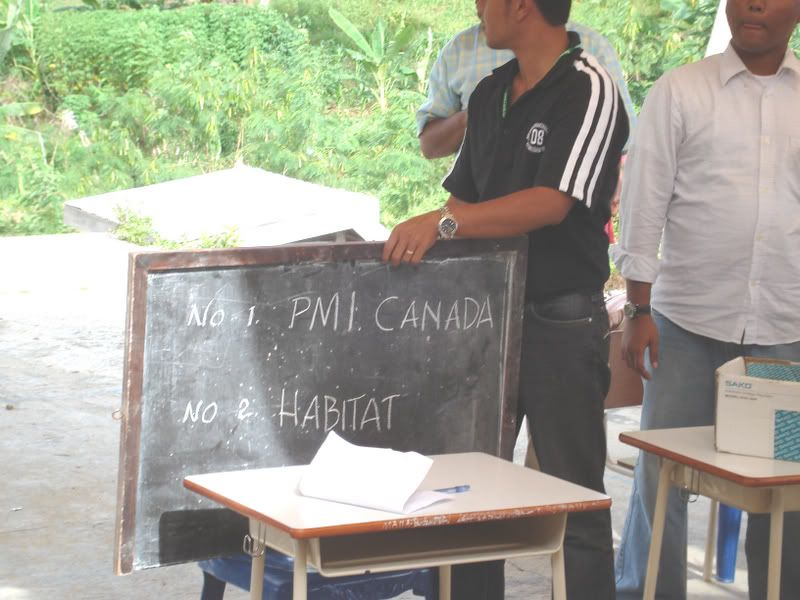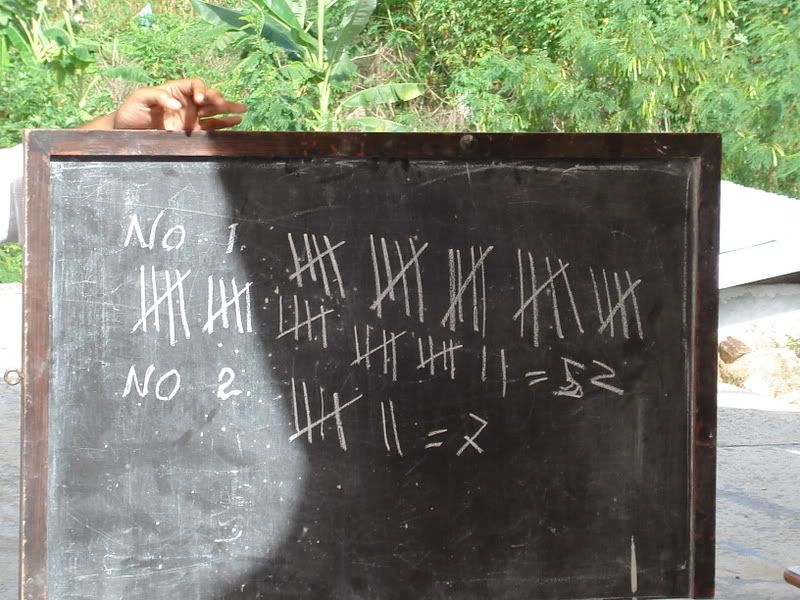 I said those words in the UNDP workshop at Swissbel Hotel Banda Aceh in November last year. As a speaker at that workshop, I shared our experience on land issues amongst the NGOs.
I said those words in the UNDP workshop at Swissbel Hotel Banda Aceh in November last year. As a speaker at that workshop, I shared our experience on land issues amongst the NGOs.Before Aceh reconstruction commenced, NGOs gathered to discuss one of the main important issues which is land division. In the meeting coordinated by UN, the NGOs pledge their commitment to the government. At that time in high spirits many NGOs promised to build a large number of houses in their area. The area, which is the land, which was entrusted for them as their working area. Some NGOs received larger areas to engage than others. The bigger the commitment, the bigger the area received.
The time went on and problems emerged. The reconstruction process is not easy work. The problem of transportation, un-cooperated beneficiaries, unprepared local government, short of material for construction, are some difficulties which hamper the reconstruction progress. Those create frustration. And to add the annoyance, it was found out that some NGO received the same area with other NGO. It is an overlapping area.
The problem of the overlapping area is the NGO and/or the community wants only one NGO who is working in their village. I believe this is good. This condition can reduce the jealousy which produces by dissimilar benefit that they can get from different NGO. The NGO will have more room to apply the terms and conditions according to their mission on community development.
An example of that situation is in Crak Mong village, Sampoinet sub-district, Aceh Jaya district. In April 2005 we started our project by building our office in Crak Mong village. The office is a duplex house which is made of brick. After the project is completed, those houses will be delivered to the community. The Crak Mong office will serve 4 villages i.e.: Crak Mong, Blang Monlueng, Meunasah Kulam and Alue Gro.
House constructions in the three villages went on, but not in Crak Mong. In this area the people had disagreement amongst themselves. Some of them wanted to have on-site reconstruction while others wanted to have relocation site at the hill. We told the community to settle down the difference and choose where they want to build. The dispute went on and on for 10 months, preventing us from kickstarting our work. In February 2006, the problem is getting bigger.
 Canadian Red Cross came to us showed their Memorandum of Understanding with sub-district head, that Crak Mong is their working area. So, they have the same MOU as we have on Crak Mong. This is what we call the overlapping area. They asked us to hand over the area. They came to Crak Mong villagers promised them that they will get temporary shelter of International Federation of Red Cross at their previous house land. And in June 2006 they will have a brand-new house on the hill. So Crak Mong beneficiaries will have two houses. One is the temporary shelter and shortly they will have the brick house too. The offer of course was attractive!
Canadian Red Cross came to us showed their Memorandum of Understanding with sub-district head, that Crak Mong is their working area. So, they have the same MOU as we have on Crak Mong. This is what we call the overlapping area. They asked us to hand over the area. They came to Crak Mong villagers promised them that they will get temporary shelter of International Federation of Red Cross at their previous house land. And in June 2006 they will have a brand-new house on the hill. So Crak Mong beneficiaries will have two houses. One is the temporary shelter and shortly they will have the brick house too. The offer of course was attractive!We didn’t want to fall into NGO rivalry. Our instruction to Sugio, our West Coast Center Manager is just dropped that area and gave to CRC. But just giving away the site to CRC is not simple. Our workers who are Crak Mong villagers wanted us to build their houses. We couldn’t wait any longer after we had been working for more than 10 months. And we were happy that UNORC arranged and led the villagers’ election. On May 19, 2006, the election took place and CRC won the vote. It was a landslide winning. We were happy and congratulated CRC that Crak Mong community became theirs.
 These pictures were taken on the election day. But today when I am writing this blog, more than eleven months after, none a single brick house was built.
These pictures were taken on the election day. But today when I am writing this blog, more than eleven months after, none a single brick house was built.Crack Mong was not the only area that we gave to other NGO. Some villages like Teupin Perao, Simpang Peut also gave to other. While the majority of those who work on reconstruction tend to go into rivalry, competing in having larger beneficiaries, we do not want to be like that. We go to the contrary course.
In that UNDP workshop I shared these mindsets:
1. The more land released; the more houses built. If our community is divided, some of them want to have our program and others want to receive from other NGO, just drop them. Let them who are willing to receive programs from others be removed from our list. We just focus on those who are ready to abide by our terms and conditions. The result is immense. We move faster. I believe 4,200+ houses we have built today, is one of the pieces of evidence that the mindset is true.
2. We respect the disaster affected people; we are on their side. If other NGO can work better and faster than us, that NGO should serve the community. It is not wise if we block the community from accepting better and earlier help.
Arwin Soelaksono - Disaster Response & reConstruction